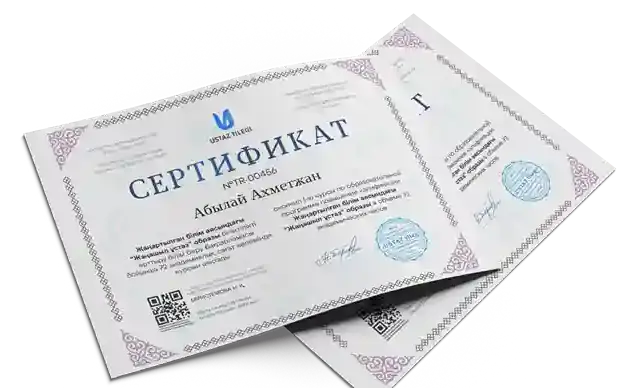PROBLEMS OF YOUNG AGE
LEARNING OF ENGLISH LANGUAGE

Kulakhmetova Ainur
Izbasarovna
Kyzylorda oblast, Shieli
district
№219 Kazakh secondary school
named after Altynsarin
Language is a means of
communication. Language is done by speaking."The future of the
educated people will not be uncertain," said the younger
generation. Communication has a special place in, conscious,
intelligent, upbringing and education. The modern world of
globalization requires openness and accuracy, so it is necessary to
know foreign languages along with their mother tongue, for those
who seek to find a way out of their lives, to acquire a prestigious
profession, to give them a good mood and a bright future for
themselves and their families. When to say about foreign language
teaching, we have to remember that communication is
important.
More precisely, According to
the legislation of the Republic of Kazakhstan, the third
international communication of language in country is the English
language. "English is the language of the 21st century. This
language is a language that promotes the Kazakh language and brings
it to the world level. " And, as a world language, informal
learning of English profits the nation's competitiveness. The
massive knowledge of English on our nation will save you from the
loss of your loss of wealth, which is done in the same language.
Hence, our children's English is a requirement of
time.
The role of interdisciplinary
communication, especially foreign language, with the Kazakh and
Russian languages plays a special role in the process of teaching
foreign languages, because the main purpose of these disciplines is
to teach teenagers language. The student will gain a deep
understanding of the life, history and culture of his country by
learning about foreign languages, learning about the life, history
and culture of other countries.
. The main purpose of English
language learning is to develop communication skills and develop
relationships with students. In reaching this key goal, we need to
develop and develop students' skills in line with the program
requirements.
•
Anticipate
•
Speaking (in the form of a
monologue and a dialogue)
•
Reading
•
Writing and writing
letters
The development of oral speech
in the early stages of English language influences the development
of the oral vocabulary. Oral speech is the basis for other business
development.
It is also clear that
motivation plays an important role in learning a foreign language
from an early age.
Junior students are very
sensitive. The "victories" in classrooms, especially in foreign
language classes, have an impact on their mental health. For
example: In a foreign language lesson, pupils learn a few sentences
in English while they are in the dating dialogue. It encourages
students to learn and master foreign
languages.
The famous scientist N.
According to D. Galskova, junior students are prone to foreign
language learning. The child's imitation ability, natural
curiosity, always creates favorable conditions for learning new
things.
Motivation factors
include:
•
The variety of educational
content;
•
Strengthening student-teacher
relationships;
•
The
teacher;
The great writer of Kazakh
literature, the great Abay, says: "Your students need to have a
great learning and interest in reading." Indeed, only a person who
is vigilant, who always wants to know everything and who has shown
persistence and endurance will reach his
goal.
An English language teacher
should use not only the textbook, but also other supplementary
material from newspapers, magazines, and even the Internet to
enhance students' interest in the language. In order for students
to master the material fully and quickly, the teacher should be
able to organize the lesson using a variety of visual aids. In
order to stimulate students' interest in the English language, the
teacher should use different methods, but these methods must meet
the following requirements:
•
It is necessary to create a
pleasant atmosphere for students to feel free through the methods
and to encourage students' interest and to create the need to use
the language in practice.
•
The student should be fully
involved in the learning process, his emotions and his / her
emotions should be related to his / her
needs.
•
It is necessary to encourage
his linguistic creative abilities.
•
Activate the student as a key
person in the learning process and closely interact with other
learners;
•
Help the student to work
independently, depending on his / her physiological, intellectual,
psychological peculiarities;
Different types of work should
be used individually, couples, groups, classes and
more.
Visualizations are technical
and non-technical tools that increase students' motivation for
foreign language. Visualizations, that is, beautiful illustrations,
layouts and applications, thematic albums, stands, magnet boards,
technics, computer, interactive whiteboards, multimedia classes,
TVs, videos, etc. provides invaluable assistance to a teacher in
teaching a foreign language. Since there is no foreign language
atmosphere at school, the objective world is modeled only through
visual aids. Through visual aids, the teacher simulates objective
reality to achieve the learning process
goals.
One of the most effective ways
to teach a foreign language from an early age is game. During the
game, the child adopts norms and actions in the developing social
environment in which he lives, that is, the game plays a cognitive,
guiding role for the child. The game enhances the interest of
children in foreign language, transforms lessons, makes fun of
students, does not drown students, develops their desire for
knowledge, intensifies them, that is, their perception, memory, and
awareness.
Finally, it is very effective
to learn a foreign language from an early
age.
In today's world it is
impossible to join the ranks of civilized countries without
science. And today's lessons of school teachers are the key to
these issues. We want to solve this problem with our own
experience. Every child has less and less life experience. Ignoring
the child's roots, identifying those experiences, and contributing
to the love and respect of his or her knowledge of life, I think
every student will not be sluggish.
The great enlightener Y.
Altynsarin said: "A good teacher is more precious than me, because
a good teacher is the heart of the school." Being the "heart of the
school", we should be the educated, educated educator, who will
generate a new generation of knowledge, educate and educate the
generation of our new sovereign nation.









